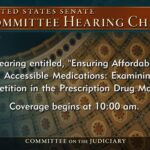NEWS
MGA’s Alex Brill Serves as a Panelist at Bipartisan Policy Center’s “Global Competitiveness in the Age of Political Populism”
At an event on promoting economic growth amid a populist backlash, Alex Brill discussed the impact of the corporate tax on workers: “Politicians have used the tax policy debate in campaigns for forever, and they generally use tax policy ideas in a very direct way: ‘My tax plan will affect your tax bill this much — directly.’
Bernie Sanders’ State Wants to Unlearn the Lesson of Competition
On July 1, the state of Vermont is set to impose a $1,000 per day per product fine on any food manufacturer who fails to disclose on the product label if any ingredients contain genetically modified organisms (GMOs). The effect of the new law will be to reduce choices for consumers, limit supply, and increase food prices. And these consequences will be felt far beyond the tiny state’s borders.
MGA’s Alex Brill Serves as a Panelist at AEI’s “E-Cigarettes and Public Health: What’s Next After the FDA Rule?”
In an event following the release of FDA’s May 2016 “deeming rule,” which applied tobacco regulations to e-cigarettes, Alex Brill examined Congressional aspects of public policy related to the deeming rule and to e-cigarettes more broadly. Specifically, he looked at what Congress intends to do about e-cigarettes, focusing on three questions: First, what are congressional attitudes about the deeming rule and e-cigarette regulation generally? Second, is it a partisan issue? And third, looking beyond the deeming rule, how will Congress affect e-cigarette use more broadly in the future? “I think that the next battle that Congress will look to tackle with respect to e-cig products is the tax question,” said Brill.
Obama’s Wall Is Bad Too
Donald Trump’s proposal to build a wall between the United States and Mexico has been widely criticized. But the Obama administration is building its own wall around the United States. The Obama wall is built of rules that inhibit U.S. firms from pursuing inversions to escape the punishingly high US corporate tax rate. Both walls will harm Americans.
S is for Savings: Pro-Growth Benefits of Employee-Owned S Corporations
S ESOPs, which are defined contribution retirement plans that allow employees to become owners, are increasingly popular in the US…. S ESOPs exist across a wide spectrum of industries and include a meaningful number of US employees. As the US seeks to rebound from a period of tepid productivity growth, tools such as S ESOPs can improve worker commitment, reduce worker turnover, and lower production costs.
The Search for the Best Middle-Class Tax Cut
“Using…open-source models, Brill found that doubling the standard deduction and expanding the 10 percent rate would each result in a tax cut for about 75 million middle-class Americans. Expanding the 15 percent rate would give about 30 million of them a tax cut. That’s a big gap. Expanding the 15 percent bracket, though, would deliver more than twice the added economic growth of the other options, Brill’s models projected, by incentivizing far more additional work and investment in the economy.”
Understanding Middle-Class Tax Cuts
Middle-class tax relief has widespread support across the political spectrum, but the consequences of different strategies for achieving this goal are not well understood. The analysis finds that either doubling the standard deduction or expanding the brackets for the 10 or 15 percent tax rates have quite different effects both within the middle class and across the aggregate economy.
Observable Flaws in CMS’s Dialysis Star-Rating System and a Proposed Alternative
In January 2015, CMS launched a star-rating system for U.S. dialysis facilities. This article analyzes nearly 6,000 U.S. dialysis facilities and explores trends and variations in star-rating scores based on facility characteristics and local demographic factors. Statistical tests show variation across states and by demographic factors.
Brief of the Tax Economists as Aamici Curiae in Maryland Comptroller v. Wynne
The Maryland income tax scheme at issue here is as discriminatory as any tariff. Its discriminatory nature does not arise, as the Maryland Court of Appeals reasoned, from the risk that it may combine with some other state’s tax system to tax the same income twice.
Framework for Evaluating Tax Extenders
As you carefully define in the document setting forth this hearing, “tax extenders” are a subset of the tax provisions extended by Title VII of the “Tax Relief, Unemployment Insurance Reauthorization, and Job Creation Act of 2010” (Public Law No. 111-312), as well as a number of other tax provisions that have expired or will expire this year.
Tales From the Unemployment Line: Barriers Facing the Long-Term Unemployed
As my testimony will describe, the recent improvement in payrolls and the unemployment rate are welcome news, but the plight of the long-term unemployed in the United States is considerable. The policies that have been executed since mid-2008 to foster an economic recovery have failed to deliver measurable results, and those most hurt by the current downturn are often the long-term unemployed. In fact, some policy actions taken by Congress and the Administration have likely exacerbated the duration of unemployment for some workers, the consequences of which are significant fiscal, economic, and social costs.
The Real Tax Burden: More Than Dollars and Cents
Using the fundamental concept of “excess burden” as their guide, in “The Real Tax Burden: More Than Dollars and Cents,” Alex Brill and Alan Viard illustrate how taxes work and their affect on such things as wages, savings, and economic growth. The authors describe past and present forms of taxation, discuss our current income and corporate tax policy, and critique various options for fundamental tax reform. “The Real Tax Burden” is a primer in the Values & Capitalism series intended for college students.
Social Security’s Finances
As the Subcommittee is well aware, the 2011 Social Security Trustees Report was released last month, and it projects that the combined Social Security trust funds will begin to be drawn down in 2023 and will be exhausted in 2036, one year earlier than projected in the 2010 Trustees Report.
The State of U.S. Manufacturing
The significance of manufacturing to the U.S. economy is undeniable, and the role and dynamics of this sector are important to study. It is critical to recognize, however, that manufacturing is but one segment of the U.S. economy, and the share of the resources dedicated to this sector should be determined by market forces, not government policy.
Retirement Security: Challenges Confronting Pension Plan Sponsors, Workers, and Retirees
Sound retirement security policy for future retirees requires planning. Ensuring the goal of adequate asset accumulation at retirement necessitates sufficient savings throughout an individual’s career. To that end, workers need to be engaged; employers need to be responsible; and policymakers must ensure that pension law, tax law, and the Social Security system operate in a manner that promotes opportunities for private saving, appropriate retirement asset management, and sustainability and predictability. Together, these programs should complement the goal to strengthen the financial security of our workforce.


























